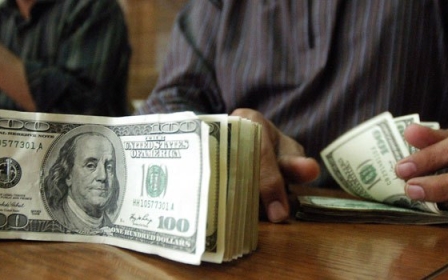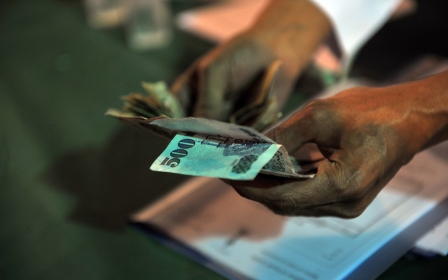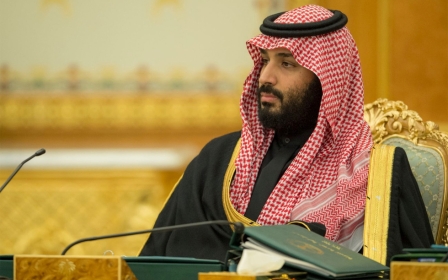ANALYSIS: Money flees Saudi Arabia at rapid pace
A torrent of money has fled Saudi Arabia as a result of its struggling economy.
It’s bad news for a country that is desperately trying to shed its dependence on the energy business and refashion its economy for a post-oil world.
New research shows the kingdom saw tens of billions of dollars of capital leave the kingdom each year from 2012 up to and including last year. Next year there will be more of the same, states the March-dated report from the DC-based think tank, the Institute of International Finance (IIF).
As much as $64bn in core capital left Saudi Arabia in 2017 based on data through the third quarter
“Core capital flows ran at a substantially negative pace last year... with little sign of improvement in the data through Q3 2017,” the report stated.
Capital refers to cash and other economic assets. In the case of the study, IIF analysts removed overseas borrowing made by the kingdom. The result is the so-called “core capital flow”.
“Prior to recent years, Saudi didn’t borrow externally, so we wanted to strip that out to see whether there are outflows or inflows,” says Greg Basile, senior research analyst at IIF.
What they found was a substantial and consistent outflow of capital.
As much as $64bn in core capital left Saudi Arabia in 2017 based on data through the third quarter, the report estimates. That’s up from $55bn the year before. This year the outflow is set to continue with a projected $26bn to leave the country.
Why the exodus?
Did the financial seizures of princes and other royals get taken into account in the IIF report? Probably not.
“Chances are we won’t see the effect of the capital outflow from that until this year,” says Marcus Chenevix, a Middle East-North Africa analyst at the financial firm TS Lombard in London.
The reason is simple. The princes were detained and therefore were not free to arrange to move assets out of the Kingdom, says Chenevix.
“Did capital immediately leave the country? Probably not,” he said.
Now that the Ritz hotel episode appears over, it seems likely there will be more capital flight because everyone involved is free to do so.
“Importantly other people not caught up in the arrest will feel more of a motivation to have assets outside of Saudi Arabia,” he says. In other words, there may be a round of major capital flight coming with rich residents moving assets outside the Kingdom.
But perhaps the most significant reason for capital leaving Saudi Arabia is the lacklustre domestic economy.
Despite recent moves to steer away from its dependence on oil exports, the country is still heavily chained to the variations of the international energy market.
Energy and related products still account for 87 percent of the government budget, and nine-tenths of exports, according to the CIA World Fact Book.
As a result, when the oil market sank, the Saudi economy suffered. The country’s growth fell from an annualised rate of more than 10 percent in 2011 to actually contracting last year, according to data from TradingEconomics.com. The cause was falling oil prices, which as recently as mid-2014 were trading at more than $100 a barrel but fell to a low of $26 in February 2016.
Hand in glove with the fall in oil prices came cutbacks in government spending, which is fuelled overwhelmingly by oil revenues. Government spending peaked in 2014 and was slashed in 2015, and even further in 2016. Those cuts have hurt GDP growth.
“When that spending stopped in 2014, a lot of investment funds and banks were caught out,” said Chenevix. Now those investors want to diversify their holdings across a wider array of assets, he said. In other words, they want investments that aren't all attached at the hip to oil.
Capital needed
It is a sad irony that capital is fleeing Saudi Arabia in part because of the kingdom’s dependency on oil revenue. Crown Prince Mohammed bin Salman (colloquially known as MBS) is intent on modernising the country and diversifying the economy away from its focus on oil.
However, to grow the non-oil sector, MBS will need foreign capital. In other words, people or companies with money will need to risk their capital by investing it in Saudi Arabia. Without the capital, it will be impossible for the country to diversify its economy away from its dependence on oil and energy.
A lynchpin of Saudi Arabia's diversification strategy is to sell off a stake in the state-owned oil company Aramco. That sale now has been delayed until later this year or early in 2019.
“The privatisation is an important component of the kingdom’s modernisation effort, not a desperate attempt to raise money,” according to a recent report from political risk consulting firm Eurasia Group. That means “market conditions” are the key consideration in the timing of the sale.
Specifically, a strong oil market is the first component. If the price of crude oil starts to sink again, then that would not bode well for Aramco’s privatisation. On top of that, investor demand for shares in the company is vital as well.
Both strong demand for Aramco shares and a robust energy market must be present for the best results in the sale.
If MBS and his advisors can successfully pull off the sale of a stake in Aramco, then it will likely encourage other investors to see the plans to modernise the economy as more than just wishful thinking.
”The [grander] aim is to continue to build support for the crown prince’s agenda of change, as well as foreign investor interest in the kingdom’s diversification efforts,” the Eurasia Group report stated.
Until that success actually occurs, it is likely that potential investors in Saudi Arabia will remain sceptical and capital will continue to flee.
This article is available in French on Middle East Eye French edition.
Middle East Eye propose une couverture et une analyse indépendantes et incomparables du Moyen-Orient, de l’Afrique du Nord et d’autres régions du monde. Pour en savoir plus sur la reprise de ce contenu et les frais qui s’appliquent, veuillez remplir ce formulaire [en anglais]. Pour en savoir plus sur MEE, cliquez ici [en anglais].




